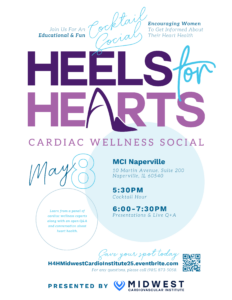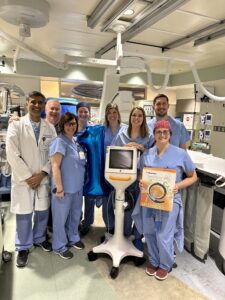This July marks four years since the launch of Midwest Cardiovascular Institute. And what an incredible journey it’s been.
When MCI first opened its doors in 2021, our vision was clear: to create a physician-led cardiovascular institute where patients receive the most advanced, compassionate heart care in a setting that puts people first always. Today, we’re proud to say that vision is thriving.
Over the past four years, we’ve had the privilege of caring for more than 266,000 patients in clinic, welcoming over 41,000 new patients, and managing nearly 127,000 hospital visits. These numbers are more than just data points, they represent lives touched, hearts healed, and a community that trusts us with their most vital care.
We’ve grown from a few core offices to a network of locations across the western suburbs, added cutting-edge services like coronary CTA, cardio@home monitoring, and an in-house blood lab, and welcomed talented physicians, advanced practice providers, and staff who continue to raise the bar in cardiovascular care. Today, MCI is powered by over 240 employees, including 28 board-certified cardiologists and 22 advanced practice providers, all united by our shared mission to serve with excellence.
As we celebrate this milestone, we’re not just looking back, we’re looking forward. Innovation, access, and personalized care remain at the heart of everything we do. Whether it’s pioneering new treatment technologies, deepening our research and education efforts, or expanding outreach in our communities, MCI is committed to shaping the future of heart care.
To our patients, partners, and team, thank you for being part of our story. Here’s to four remarkable years and many more to come.
Heart disease is the number one killer of women each year. Yet, many women do not understand their risk or realize how heart disease looks and feels different in women. Midwest Cardiovascular Institute understands the importance of awareness, prevention and education for women and heart disease. That’s why we are proud to announce Heels for Hearts: Women’s Cardiac Wellness Social. Join us on Thursday, May 8th from 5:30 – 7:30 p.m. at Midwest Cardiovascular Institute in Naperville. This FREE event features: Expert Panel Presentations & Open Q&A – Hear from top health professionals as they share valuable insights on heart health, followed by an interactive discussion. This event will also include drinks, games, door prizes, a photobooth and more! Registration is required, please reserve your spot here. 
NAPERVILLE, IL – Midwest Cardiovascular Institute (MCI) is proud to announce its move to a state-of-the-art, comprehensive cardiovascular center of excellence at 10 Martin Avenue, Suite 200, effective January 20, 2025. This new location is adjacent to the current facility and was designed to meet the growing needs of the community.
“Our new facility represents a milestone for MCI as we grow to meet the increasing demand for high-quality cardiovascular care,” said Dr. Mark Goodwin, President of MCI. “We remain committed to ensuring that patients receive expert care with compassion and convenience.”
The new location features a comprehensive imaging suite, including PET/CT and coronary CT scanners, an on-site blood processing lab, ultrasound, and more than 30 exam rooms, which will reduce patient wait times and enhance efficiency. There is also convenient parking with a complimentary valet service.
“The MCI practice has doubled in size since 2021 and we recognized the need to expand to provide timely, efficient, and comfortable care,” said Jacob Corbell, CEO. “This new space allows us to increase access to care while delivering the same exceptional service patients have come to expect.”
MCI continues to offer specialized cardiovascular care, including treatment for coronary artery disease, structural heart disease, peripheral artery disease, advanced heart failure, arrhythmias, and lipid management.
MCI operates three additional locations in Elmhurst, Plainfield, and Yorkville.
Click here to schedule an appointment today.
###
September is Atrial Fibrillation (Afib) Awareness Month, a critical time to raise awareness about Afib, a common but serious heart condition. Afib is an irregular and often rapid heartbeat that can lead to various cardiovascular complications, including stroke, heart failure, and other heart-related issues.
At Midwest Cardiovascular Institute (MCI), our Afib Clinic is dedicated to helping you manage Afib so that it doesn’t disrupt your life. Our experienced team of cardiac electrophysiologists and advanced practice providers specialize in evaluating and reducing your risks associated with Afib, offering the most advanced treatment options available. We are committed to supporting you on your journey back to a normal heart rhythm, beat by beat.
Atrial Fibrillation occurs when the upper chambers of the heart beat chaotically and don’t synchronize with the lower chambers. This irregularity can be caused by various factors, including heart conditions, high blood pressure, sleep apnea, excessive alcohol consumption, and sometimes it may occur without a known cause.
Some people with Afib may not experience any symptoms at all. However, common symptoms include:
- Heart racing
- Chest pain
- Light-headedness
- Irregular heartbeat
- Fatigue
- Shortness of breath
While there is no permanent cure for Afib, effective management strategies can help you live a full and healthy life. These strategies include lifestyle modifications, medications to control heart rate and rhythm, and procedures such as ablation to restore normal heart rhythm. In some cases, blood thinners may be necessary to reduce the risk of stroke.
At MCI, we provide comprehensive care tailored to your needs, helping you navigate your treatment options and find the best path forward.
It’s essential to assess your stroke risk if you have Afib. Factors such as congestive heart failure, hypertension, diabetes, previous stroke or Transient Ischemic Attack (TIA), and age (65 and older) can increase your risk. Our team at MCI will work with you to evaluate your risk and determine the appropriate preventive measures.
Don’t let Afib go unchecked. Take control of your heart health today. Schedule an appointment with our expert team at MCI to discuss your symptoms, evaluate your risk factors, and explore the best treatment options for you. Your heart deserves the best care—make an appointment today and take the first step towards a healthier future.

As we celebrate Juneteenth this June, commemorating the emancipation of enslaved African Americans, it’s essential to reflect on both the historical significance and the ongoing challenges faced by the African American community. Among these challenges is the issue of heart health, which disproportionately affects African Americans. This Juneteenth, let us celebrate freedom while also acknowledging the importance of prioritizing heart health in the African American community.
While Juneteenth celebrates freedom, it’s crucial to recognize that disparities in health, particularly heart health, persist within the African American community. According to the American Heart Association, African Americans are at a higher risk of developing heart disease compared to other racial or ethnic groups. They are more likely to have high blood pressure, which is a significant risk factor for heart disease and stroke. Additionally, African Americans tend to develop heart disease earlier in life and experience more severe outcomes.
Several factors contribute to these disparities, including socioeconomic conditions, limited access to healthcare, cultural influences, and genetic predispositions. Structural inequalities, such as restricted access to healthy foods, safe recreational spaces, and quality healthcare services, exacerbate these issues.
This Juneteenth, let’s emphasize the importance of heart health in the African American community by:
- Understanding risk factors like high blood pressure, diabetes, obesity, and smoking, and getting regular check-ups.
- Adopting healthy lifestyles with balanced diets, regular exercise, avoiding smoking, and limiting alcohol.
- Supporting policies that address social determinants of health, improve healthcare access, and promote preventive care.
- Educating and empowering others to prioritize heart health and seek preventive care.
Juneteenth is a time to celebrate freedom and the journey towards equality and justice. By addressing health disparities and promoting healthy choices, we can work towards ensuring that everyone has the opportunity to live healthy, fulfilling lives. Happy Juneteenth!
NAPERVILLE, IL – Midwest Cardiovascular Institute (MCI) has been selected by Modern Healthcare as one of the 2024 Best Places to Work in Healthcare.
This award program identifies and recognizes outstanding employers in the healthcare industry nationwide. Modern Healthcare partners with the Best Companies Group on the assessment process which includes an extensive employee survey. This means that the survey answers from MCI employees earned this designation for the practice. Initiatives such as employee engagement help to create MCI’s unique culture that fosters employee satisfaction.
It’s an honor to be recognized by Modern Healthcare,” said Dr. Mark Goodwin, MCI interventional cardiologist. “Our staff means everything to us at MCI! Their energy and passion to take care of patients makes MCI a special place.”
“With all the economic uncertainty, staffing challenges, and folks wanting more flexible work setups, every company has to get clever about how they attract and hold onto talent,” noted Dan Peres, President of Modern Healthcare. “The winners of the 2024 Best Places to Work awards really get it. They show us how vital it is to understand what employees want and need right now. With healthcare shifting so much, finding the right people is a top priority, and the winners know that keeping their team happy is the key to business success.”
MCI will be recognized at the 2024 Best Places to Work in Healthcare Awards Gala taking place October 10 in Nashville, Tennessee.
High blood pressure, or hypertension, affects millions worldwide, posing significant health risks such as heart attacks, stroke, and kidney disease. Despite medication and lifestyle changes, many struggle to manage their blood pressure effectively. However, a groundbreaking solution known as the Symplicity Spyral™ Renal Denervation (RDN) procedure, is now an option for patients. MCI is proud to offer this treatment option and provide hope for those with resistant hypertension.
Trenna Townsend, a patient of MCI interventional cardiologist Dr. Mark Goodwin, was one of the first patients to undergo the procedure at MCI. Before the procedure, she battled fatigue and high blood pressure, but Dr. Goodwin’s recommendation offered hope. Trenna’s post-procedure experience has been transformative, with increased energy and decreased headaches. Her advice to others considering the procedure is overwhelmingly positive, and she states, “Do it – it saved my life.” Trenna expresses her gratitude that she can now get back to doing what she loves – dancing and spending time with her family.
Dr. Goodwin elaborates, “This is for patients with resistant hypertension, who require multiple medications. It’s done as an outpatient procedure, with patients going home the same day.”
The Symplicity Spyral™ RDN procedure targets overactive nerves near the kidneys, which play a crucial role in blood pressure regulation. Administered under sedation, this minimally-invasive technique involves inserting a thin tube into the artery leading to the kidney. Through ablation, excess nerve activity is calmed, leading to reduced blood pressure without the need for implants.
The Symplicity Spyral™ RDN procedure represents a shift in hypertension management. Dr. Goodwin envisions broader applications, especially for patients unable to tolerate medications. Studies continue to explore its efficacy, with the goal of improving outcomes and reducing healthcare costs.
As we celebrate Women’s History Month, we want to take the opportunity to shine a light on the remarkable achievements of women in cardiology, particularly here at Midwest Cardiovascular Institute (MCI).
According to the American College of Cardiology, there are more women in cardiology now than ever. This trend reflects both the growing interest among women in cardiology and the recognition of their capabilities in this challenging discipline. Across the globe, women in medicine are making significant strides in breaking barriers, bringing new innovations, and advancing health equity.
At MCI, these exceptional women lead the charge in cardiovascular care:
Dr. Maria Rosa Costanzo is a trailblazer in heart failure management, with an impressive background in advanced heart failure therapies and cardiac transplantation. Throughout her career, she has contributed to more than 275 publications, including peer-reviewed journals, book chapters, and manuscripts. She is a fellow of the American College of Cardiology, American College of Physicians, American Heart Association, and the European Society of Cardiology, along with being a Gold Member of the Heart Failure Association of the European Society of Cardiology, showing her high standing in the medical field. Her contribution to the field of heart failure paved the way to make her an inspiration to all women in medicine.
Dr. Ann Davis stands out as an expert cardiologist on the team at MCI, with a keen focus on prevention, lipidology, and a comprehensive approach to treating heart disease. She is board certified in internal medicine and cardiovascular disease, and she is also a fellow of the American College of Cardiology. Her passion is to build meaningful connections with her patients, helping them to achieve healthy outcomes and live their fullest lives. Her technical and compassionate care as a female cardiologist is inspiring, contributing to the progression of women in cardiology around the world.
Julie Kozlowski, APRN serves as the Chief Nursing Officer at MCI in Naperville. With a Master of Science degree in nursing from Loyola University in Chicago, she has worked as an adult acute/critical care clinical nurse specialist. Now in an administrative role, Julie’s responsibilities include the oversight of clinical practice and the advancement of nursing protocols. However, what she is most known for is her passion for education, encouraging the professional development of her nursing staff. At the center of everything that she does is the patient, and she strives to improve all aspects of patient care. She is a true role model for women in nursing and in cardiology.
These women are true leaders in their field, and we are proud to have their expertise at MCI. Their work is a testament to the power of diversity and inclusion in advancing heart health for all. We honor all of the extraordinary women who are paving the way for a brighter future of female leadership in medicine.
NAPERVILLE, IL –Dr. Mark Goodwin and Dr. Anand Ramanathan, interventional cardiologists at Midwest Cardiovascular Institute (MCI), are  the first in the Midwest to use the Symplicity Spyral™ renal denervation (RDN) system to treat patients with high blood pressure. The procedure took place on December 20 at Edward Hospital, part of Endeavor Health℠.
the first in the Midwest to use the Symplicity Spyral™ renal denervation (RDN) system to treat patients with high blood pressure. The procedure took place on December 20 at Edward Hospital, part of Endeavor Health℠.
Recently approved by the U.S. Food and Drug Administration (FDA), the Symplicity Spyral™ renal denervation (RDN) system by Medtronic involves a minimally-invasive procedure that targets nerves near the kidneys that can become overactive and cause high blood pressure. The procedure is approved for use as an additional treatment in patients with high blood pressure when lifestyle changes and anti-hypertensive medications are not adequately controlling blood pressure.
Hypertension is the single largest contributor to death, (1) and affects about 50% of U.S. adults. (2) Of the U.S. adults who are aware of their hypertension, about 80% do not have it under control. (3)
The Symplicity blood pressure procedure is clinically proven to help reduce high blood pressure, (4-6) which can lower serious health risks. (7) After mild sedation, the doctor inserts a very thin tube into the artery leading to the kidney. The doctor then administers energy to calm the excessive activity of the nerves connected to the kidney. The tube is removed, leaving no implant behind.
“High blood pressure is a significant risk factor for cardiovascular disease,” said Dr. Goodwin. “Patients with high blood pressure or hypertension now have a new, innovative option when drugs and lifestyle changes aren’t enough. It is important to work closely with your cardiologist to manage blood pressure.”
- Hypertension fact sheet. September 13, 2019. Available at: https://www.who.int/news-room/fact-sheets/detail/hypertension. Accessed February 15, 2022. 2. Kandzari DE, Böhm M, Mahfoud F, et al. Effect of renal denervation on blood pressure in the presence of antihypertensive drugs: 6-month efficacy and safety results from the SPYRAL HTN-ON MED proof-of-concept randomised trial. The Lancet. 2018 Jun 9;391(10137):2346-2355.
- S. Department of Health and Human Services. The Surgeon General’s Call to Action to Control Hypertension. Washington, DC: U.S. Department of Health and Human Services, Office of the Surgeon General; 2020.
- Facts about Hypertension. Centers for Disease Control and Prevention. Available at: https://www.cdc.gov/bloodpressure/facts.htm. Accessed August 10, 2023.
- Kandzari DE, Böhm M, Mahfoud F, et al. Effect of renal denervation on blood pressure in the presence of antihypertensive drugs: 6-month efficacy and safety results from the SPYRAL HTN-ON MED proof-of-concept randomised trial. The Lancet. 2018 Jun 9;391(10137):2346-2355.
- Böhm M, Kario K, Kandzari DE, et al. Efficacy of catheter-based renal denervation in the absence of antihypertensive medications (SPYRAL HTN-OFF MED Pivotal): a multicentre, randomized, sham-controlled trial. The Lancet 2020; Published online March 29, 2020. DOI: 10.1016/S0140-6736(20)30554-7.
- Townsend RR, Mahfoud F, Kandzari DE, et al. Catheter-based renal denervation in patients with uncontrolled hypertension in the absence of antihypertensive medications (SPYRAL HTN-OFF MED): a randomised, sham-controlled, proof-of-concept trial. The Lancet. 2017;390:2160–2170.
- Ettehad D, Emdin CA, Kiran A, et al. Blood pressure lowering for prevention of cardiovascular disease and death: a systematic review and meta-analysis. The Lancet. 2016;387:957-67.
David, age 79 of Chicago, suffered a heart attack, and is grateful for his second chance at life because of the physicians at Midwest Cardiovascular Institute. “I know how close I was to not being here,” he said. “But I have no visible or internal awareness of that now.”
Hear from David, Dr. Mark Goodwin, and Dr. Anish Amin, and watch the heartfelt reunion between David and Dr. Goodwin.
To see a cardiologist at one of our locations, click here to request an appointment.